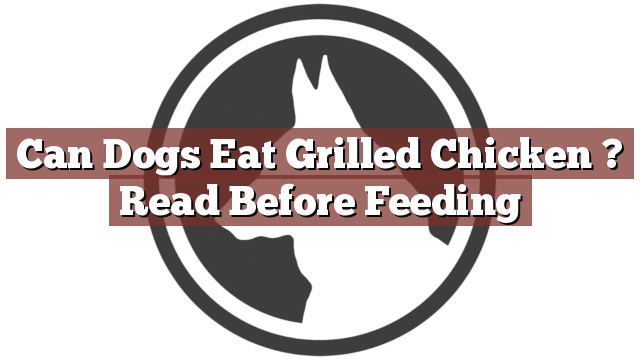Understanding Your Dog’s Dietary Needs
As a responsible dog owner, it is crucial to understand your dog’s dietary needs in order to provide them with a balanced and nutritious diet. Dogs are omnivores, meaning they can consume both meat and plant-based foods. However, their nutritional requirements differ from humans. Dogs require a diet that is high in protein and low in carbohydrates. It is essential to provide them with a well-balanced diet that includes vital nutrients like vitamins, minerals, and fatty acids.
Can Dogs Eat Grilled Chicken? Read Before Feeding
One common question that dog owners often have is, "Can dogs eat grilled chicken?" The answer is yes, dogs can typically eat grilled chicken, but it is important to take a few precautions. Grilled chicken can be a healthy and tasty addition to your dog’s diet, as it is a good source of lean protein. However, it is crucial to ensure that the chicken is plain, boneless, and skinless. Seasonings, spices, and sauces used in grilling may contain ingredients that can be harmful to dogs, such as garlic or onion powder. These ingredients can be toxic to dogs and should be avoided.
Pros and Cons of Feeding Grilled Chicken to Your Dog
Feeding grilled chicken to your dog can have several benefits. Firstly, chicken is a lean protein source that can aid in muscle development and repair. It also provides essential amino acids, which are the building blocks of proteins. Additionally, chicken is rich in vitamins and minerals such as B vitamins, zinc, and iron, which are crucial for your dog’s overall health.
However, there are some cons to consider as well. The chicken should be cooked thoroughly to eliminate any harmful bacteria that can cause foodborne illnesses. It is important to avoid feeding your dog chicken bones as they can splinter and pose a choking hazard or cause internal injuries. Moreover, while plain grilled chicken is generally safe for dogs, excessive consumption can lead to obesity and other health issues. It is important to feed chicken in moderation and as part of a balanced diet.
Conclusion: Considerations and Recommendations for Feeding Grilled Chicken to Dogs
In conclusion, dogs can eat grilled chicken, but it is essential to take certain precautions. Ensure that the chicken is plain, boneless, and skinless, without any seasonings or sauces. Additionally, make sure the chicken is thoroughly cooked to eliminate any potential bacteria. Feed grilled chicken to your dog in moderation, as part of a balanced diet that meets their nutritional needs. If you have any concerns or questions about your dog’s diet, it is always recommended to consult with a veterinarian for personalized advice.
By understanding your dog’s dietary needs and making informed choices, you can provide them with a healthy and enjoyable diet that keeps them happy and thriving. Remember to prioritize their well-being and ensure that any food you offer is safe and beneficial for their overall health.
Thank you for taking the time to read through our exploration of [page_title]. As every dog lover knows, our furry friends have unique dietary needs and responses, often varying from one canine to another. This is why it's paramount to approach any changes in their diet with caution and knowledge.
Before introducing any new treats or making alterations to your dog's diet based on our insights, it's crucial to consult with a veterinarian about [page_title]. Their expertise ensures that the choices you make are well-suited to your particular pet's health and well-being.
Even seemingly harmless foods can sometimes lead to allergic reactions or digestive issues, which is why monitoring your dog after introducing any new food item is essential.
The content provided here on [page_title] is crafted with care, thorough research, and a genuine love for dogs. Nevertheless, it serves as a general guideline and should not be considered a substitute for professional veterinary advice.
Always prioritize the expert insights of your veterinarian, and remember that the health and happiness of your furry companion come first.
May your journey with your pet continue to be filled with joy, love, and safe culinary adventures. Happy reading, and even happier snacking for your canine friend!

